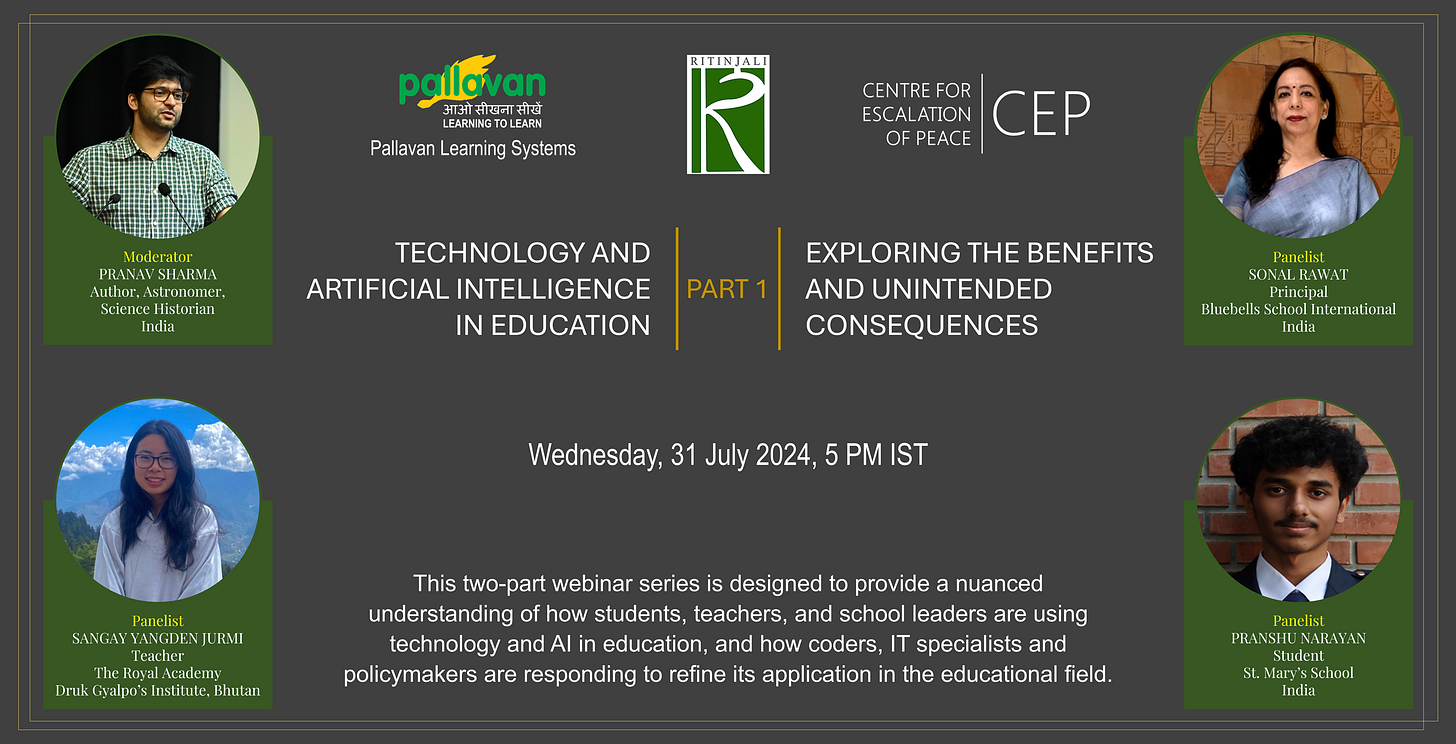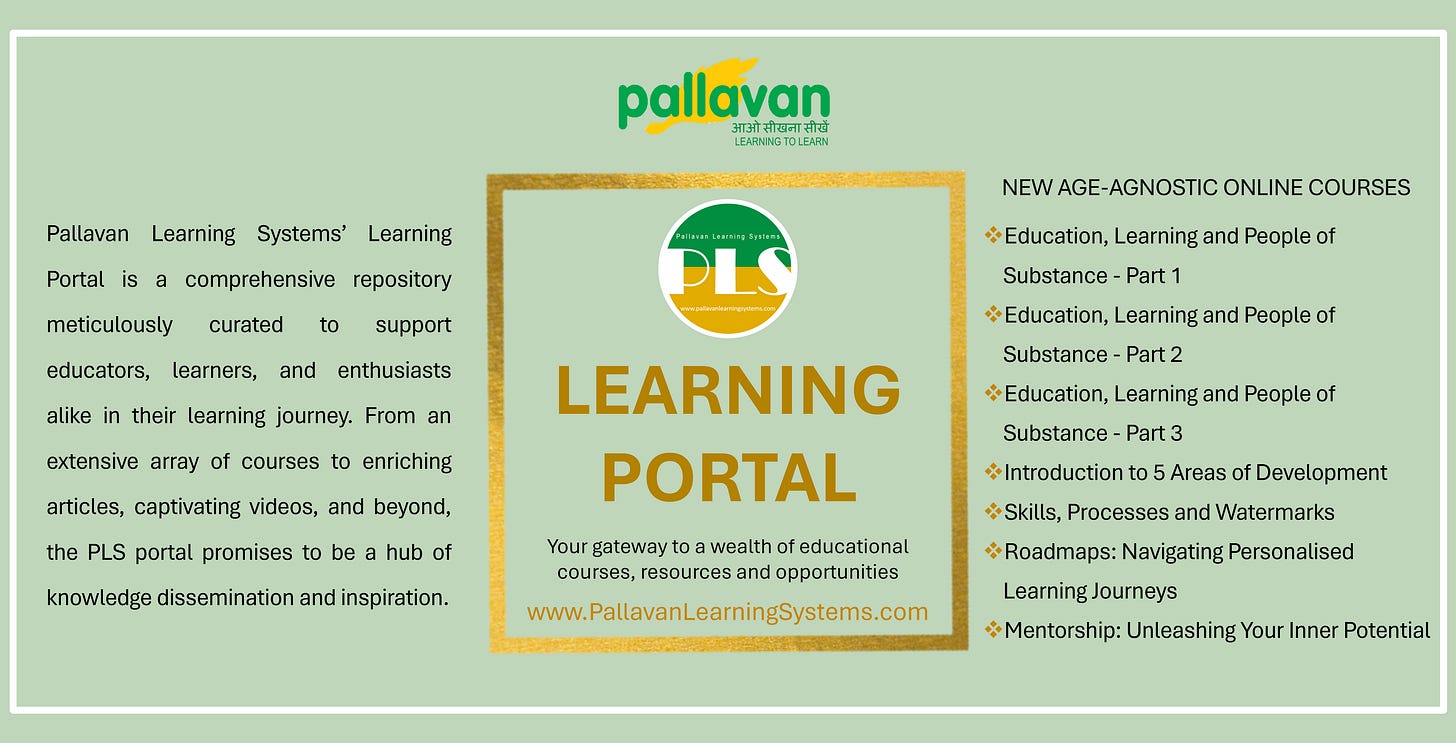We hope this message finds you well. We are reaching out to you since you have been a part of our programmes. It has been a delight to share ideas and insights with you during our events and webinars. If you wish to subscribe to our newsletter and get regular updates, please subscribe to our Substack.
Here is our latest edition for your information.
Editor’s Note:
Dear Reader,
Welcome to the August issue of our newsletter! This month, we're exploring the fascinating evolution of online learning. From its humble beginnings in the 1960s to the advanced, interactive platforms we see today, online education has transformed the way we learn and teach.
In our feature article, we delve into the historical milestones, technological advancements, and future innovations that continue to shape online learning. We also introduce the Pallavan Learning Systems (PLS) Portal, a new resource designed to support educators and learners with a wide range of courses and materials.
We hope you find this issue both informative and inspiring. Happy reading!
Featured Articles
The Evolution of Online Learning
by Poojan Sahil
Online learning has come a long way since its early beginnings in the 1960s. From simple computer-based training systems to the sophisticated platforms we see today, the evolution of online education has been a remarkable journey. In this article, we explore the historical context, growth and expansion, current trends, and future prospects of online learning.
Historical Context
Origins of Online Learning
The roots of online learning can be traced back to the 1960s when early experiments in computer-based training laid the foundation for modern online education. These early systems, while limited in functionality, demonstrated the potential of using technology to deliver educational content. As the internet gained traction in the 1990s, these rudimentary platforms evolved into more sophisticated online learning environments.
Technological Advancements
The evolution of online learning has been closely tied to technological advancements. The introduction of Learning Management Systems (LMS) revolutionised the way online courses were delivered, providing a centralised platform for content, communication, and assessment. The integration of multimedia elements, such as video lectures and interactive simulations, further enhanced learner engagement and the overall learning experience.
Researchers have categorised the evolution of e-learning into distinct stages. E-learning 1.0 focused on basic online courses, while e-learning 2.0 introduced interactive and collaborative learning experiences. The current stage, e-learning 3.0, emphasises personalised and adaptive learning, utilising technologies like artificial intelligence to tailor educational experiences to individual learners.
Future of Education Technology in 2024: Trends in Ed-Tech and Opinions of Industry's Most Thought Leaders
by May Ohiri
Courtesy: EducateMe
Have you ever wondered if the educational system in place today is the best for learners? Do you think it will still be valid for 5-10 years?
When you consider how far education has come in such a short amount of time and where we are going, the future of education is exciting! Through the years, we have seen trends that have long been a staple of education but only recently have some of these concepts caught fire in the wake of innovations and digital learning.
Click here to read the full article.
How technology is reinventing education
by Carrie Spector
Courtesy: StanfordReport
New advances in technology are upending education, from the recent debut of new artificial intelligence (AI) chatbots like ChatGPT to the growing accessibility of virtual-reality tools that expand the boundaries of the classroom. For educators, at the heart of it all is the hope that every learner gets an equal chance to develop the skills they need to succeed. But that promise is not without its pitfalls.
“Technology is a game-changer for education – it offers the prospect of universal access to high-quality learning experiences, and it creates fundamentally new ways of teaching,” said Dan Schwartz, dean of Stanford Graduate School of Education (GSE), who is also a professor of educational technology at the GSE and faculty director of the Stanford Accelerator for Learning. “But there are a lot of ways we teach that aren’t great, and a big fear with AI in particular is that we just get more efficient at teaching badly. This is a moment to pay attention, to do things differently.”
Click here to read the full article.
Upcoming Event
Introducing PLS Learning Portal
Your gateway to a wealth of educational courses, resources and opportunities
For more information about each courses, click here
Sign Up or Login to avail these online courses from May 3, 2024.
Past Events
Calming the Mind: A Retreat with Yongey Mingyur Rinpoche
Ritinjali and Centre for Escalation of Peace in collaboration with India International Centre, Nalanda Foundation and Pallavan Learning Systems successfully concluded its 4th annual retreat with Yongey Mingyur Rinpoche on the theme ‘Calming the Mind: Joy of Living - Level One’ on 16 & 17 March 2023 with hybrid mode with in-person sessions in Delhi. Click here to read the comprehensive report on the retreat.
ASSESSMENT: Valuing what matters
The webinar was held on Thursday, 7 September 2023. Pallavan Learning Systems, in association with Ritinjali and the Centre for Escalation of Peace, conducted a webinar on the theme Assessment - Valuing What Matters. The webinar was a part of the series 'On a Quest to Learn: A series on the evolving nature of one's learning journey'. The webinar sought to look at the evolving nature of assessment and gauge its effectiveness in helping people develop into persons of substance. Read the report, watch the video.
Harmony of Head and Heart with Venerable Geshe Lhakdor
Geshe Lhakdor was in conversation with a group of eminent individuals from the education field. During this exchange, Geshe la shared insights and experiences acquired over decades in diverse roles as he deliberated on the topic, ‘Harmony of Head and Heart’. Read the report, watch the video.
Teaching Mathematics with the Help of History
The webinar was held on 23rd November 2023 Mathematics is a subject that is often seen as abstract, complex, and detached from the real world. Many students struggle to find meaning and relevance in mathematical concepts, leading to disinterest and a lack of motivation to learn. However, at Pallavan Learning Systems, we believe that Mathematics is a language – language of the universe – that helps us make sense of the physical world around us. During this webinar, Dinesh Singh strove to make Mathematics accessible, understandable and relatable with the help of History. Read the report, watch the video.
The Purpose of Life with Venerable Geshe Lhakdor
The webinar unfolded as a captivating exchange between Geshe Lhakdor and the vibrant community of students and educators from Second Chance School and Ritinjali learning centres. The event seamlessly blended physical presence at Ritinjali’s Second Chance School with a vibrant online audience, featuring Geshe Lhakdor, a renowned Buddhist philosopher, as the focal point of a spirited dialogue. Read the report, watch the video
Services
Salaam Balak Trust
We conducted a workshop on the English curriculum on July 8 which was led by Ranu Bhattacharya. She spoke about concepts in early literacy, such as phonemic awareness through songs and rhymes. It was emphasised that an early literacy classroom should have a print-rich environment, for example, the names of months, seasons, fruits, and vegetables. Functional literacy in the classroom was also highlighted as important. A few activities were suggested like heart maps and word walls for use in the classroom and beyond. The next session focused on the development of worksheets. The structure of the worksheet was discussed, and the teachers suggested elements they wanted to include in the worksheets in reference to the concepts.
Pallavan School, Jhalawar
During the session conducted by PLS in July, the teachers at Pallavan School in Jhalawar discussed various initiatives aimed at promoting collaboration among teachers and enhancing student learning, including a potential competition and a structured assessment procedure. They also engaged in complex and abstract discussions on a wide range of topics, including mathematical concepts, science experiments, personal anecdotes, and philosophical queries.
Connect with us on:
INSTAGRAM FACEBOOK X YOUTUBE


